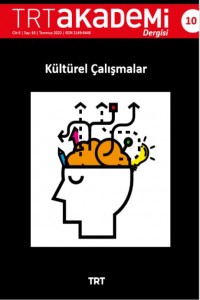Abstract
Benjamin Zephaniah'ın Refugee Boy (2001) adlı romanı çağdaş toplumda mülteci deneyimini kurgusallaştırır; yurtsuzluk, ait olamama ve kayboluş hâlini yansıtır ve on dört yaşındaki yarı Eritrealı, yarı Etiyopyalı ana karakteri aracılığıyla mülteci olma durumunun dünyanın 'uzak' bir köşesindeki suçsuz insanlar üzerindeki travmatik etkilerinin evrenselleştirilmesine olanak sağlar. Romanda, ana karakter, 'beyaz' toplumun bir parçası olabilmek adına, 'düzgün' ve 'üstün' olarak sunulan doğrular bağlamında kimliğini ve kişiliğini dönüştürme ve şekillendirme yönelimine sahiptir. Bu tür bir 'düzgünlük' ve 'üstünlük', oryantalist algının işleyişi çerçevesinde söylemsel olarak inşa edilir ve postkolonyal edebi eserlerde 'ideal' bir göçmen olmaya çalışan kolonyal öznelerin durumuna benzer bir 'ideal' mülteci kimliği yaratır. Bu argümanları dâhilinde, romanın ana karakterinin kolonyal bir özne olarak da görülebileceğini belirten bu çalışma postkolonyal teorinin çağdaş mülteci edebiyatına ait eserlerin eleştirel analizi noktasında katkı sağlayıp sağlamayacağı konusunu inceleyecektir. Ayrıca, bu çalışma 'postkolonyal eklemlenme' sürecini rasyonalize etmeye çalışacak ve romanın yakın okumasını yaparak 'postkolonyal eklemlenme' kavramının mülteci deneyimini anlamlandırmadaki uygunluğu üzerinde duracaktır.
Keywords
Benjamin Zephaniah Refugee Boy Postkolonyal Teori Postkolonyal Eklemlenme Toplumsal Kaynaşma
References
- Agamben, G. (1998). Homo Sacer: Sovereign Power and Bare Life. Stanford: Stanford Universiy Press.
- Althusser, L. (1971). Lenin and Philosophy and Other Essays. New York: Monthly Review Press.
- Balibar, E. (1991). Is there a Neo-Racism?. In Race, Nation, Class: Ambiguous Identities, edited by Etienne Balibar and Immanuel Wallerstein, 17-29. London: Verso.
- Deleuze, G. (1992). Postscript on the Societies of Control. October, 59: 3-7.
- Deleuze, G. (1995). Negotiations 1972-1990. Martin Joughin, Trans. New York: Columbia University Press.
- Foucault, M. (2008). The Birth of Biopolitics: Lectures at the College de France 1978-1979. Senellart. Graham Burchell, Trans. New York: Palgrave Macmillan.
- Gallien, C. (2018). "Refugee Literature": What postcolonial theory has to say. Journal of Postcolonial Writing 54:6, 721-726.
- Hardt, M. and Antonio N. (1994). Critique of the State-Form. Minneapolis: University of Minnesota Press.
- Kureishi, Hanif (2009). The Buddha of Suburbia, London: Faber and Faber.
- Nealon, J. T. (2018). 'That Path is for Your Steps Alone': Popular Music, Neoliberalism and Biopolitics. In Control Culture: Foucault and Deleuze after Discipline, edited by Frida Beckman, 101-120. Edinburgh: Edinburgh University Press.
- Salecl, R. (1994). The Spoils of Freedom: Psychoanalysis and Feminism After the Fall of Socialism. London: Routledge.
- Smith, Z. (2012). NW. London: Penguin Books.
- Zephaniah, B. (2001). Refugee Boy. London: Bloomsbury.
Abstract
Refugee Boy (2001) by Benjamin Zephaniah literalises the refugee experience in contemporary society, reveals the psychology of loss, unbelonging and displacement and helps universalise the traumatic realities of the refugee phenomenon upon innocent people in a 'remote' part of the world through its 14-year-old Eritrean-Ethiopian protagonist. In the novel, in order to be accepted and included into the mainstream 'white' society, the protagonist has a tendency to reshape and reconstitute his identity and personality in relation to what is presented as the proper and the superior. Such a sort of properness and superiority is discursively formed within the framework of the operation of the orientalist mentality and creates an ideal refugee identity, which resembles the case of the colonial subject in contemporary postcolonial fiction. In this context, this article, suggesting that the protagonist of the novel might be considered as a colonial subject, will investigate whether postcolonial theory might critically contribute to the analysis of contemporary refugee literature. This article will also attempt to theorise the process of postcolonial interpellation and explore the relevance of this conceptualisation in terms of articulating the refugee experience through a close reading of the novel.
Keywords
Benjamin Zephaniah Refugee Boy Postcolonial Theory Postcolonial Interpellation Social Inclusion
References
- Agamben, G. (1998). Homo Sacer: Sovereign Power and Bare Life. Stanford: Stanford Universiy Press.
- Althusser, L. (1971). Lenin and Philosophy and Other Essays. New York: Monthly Review Press.
- Balibar, E. (1991). Is there a Neo-Racism?. In Race, Nation, Class: Ambiguous Identities, edited by Etienne Balibar and Immanuel Wallerstein, 17-29. London: Verso.
- Deleuze, G. (1992). Postscript on the Societies of Control. October, 59: 3-7.
- Deleuze, G. (1995). Negotiations 1972-1990. Martin Joughin, Trans. New York: Columbia University Press.
- Foucault, M. (2008). The Birth of Biopolitics: Lectures at the College de France 1978-1979. Senellart. Graham Burchell, Trans. New York: Palgrave Macmillan.
- Gallien, C. (2018). "Refugee Literature": What postcolonial theory has to say. Journal of Postcolonial Writing 54:6, 721-726.
- Hardt, M. and Antonio N. (1994). Critique of the State-Form. Minneapolis: University of Minnesota Press.
- Kureishi, Hanif (2009). The Buddha of Suburbia, London: Faber and Faber.
- Nealon, J. T. (2018). 'That Path is for Your Steps Alone': Popular Music, Neoliberalism and Biopolitics. In Control Culture: Foucault and Deleuze after Discipline, edited by Frida Beckman, 101-120. Edinburgh: Edinburgh University Press.
- Salecl, R. (1994). The Spoils of Freedom: Psychoanalysis and Feminism After the Fall of Socialism. London: Routledge.
- Smith, Z. (2012). NW. London: Penguin Books.
- Zephaniah, B. (2001). Refugee Boy. London: Bloomsbury.
Details
| Primary Language | English |
|---|---|
| Subjects | Communication and Media Studies |
| Journal Section | Makale |
| Authors | |
| Publication Date | July 31, 2020 |
| Submission Date | April 23, 2020 |
| Acceptance Date | June 23, 2020 |
| Published in Issue | Year 2020 Volume: 5 Issue: 10 |


